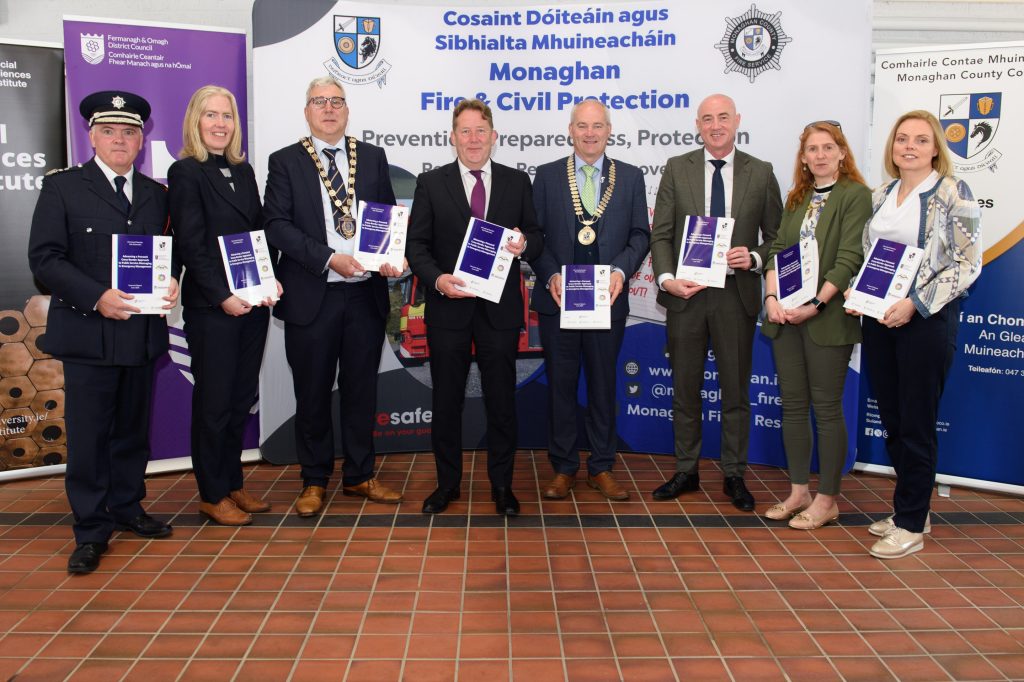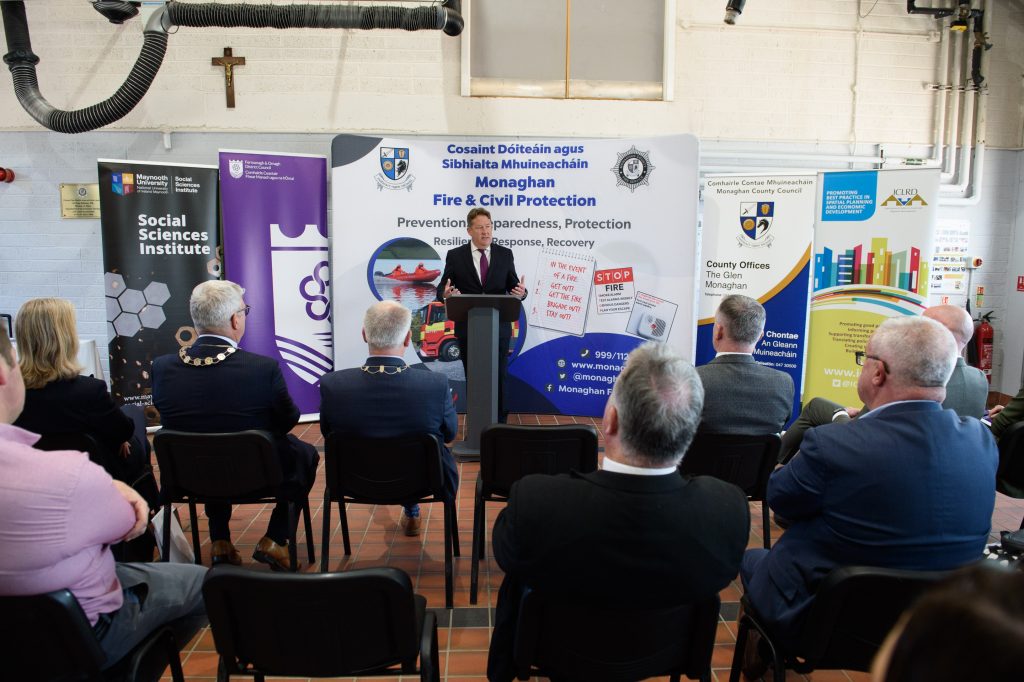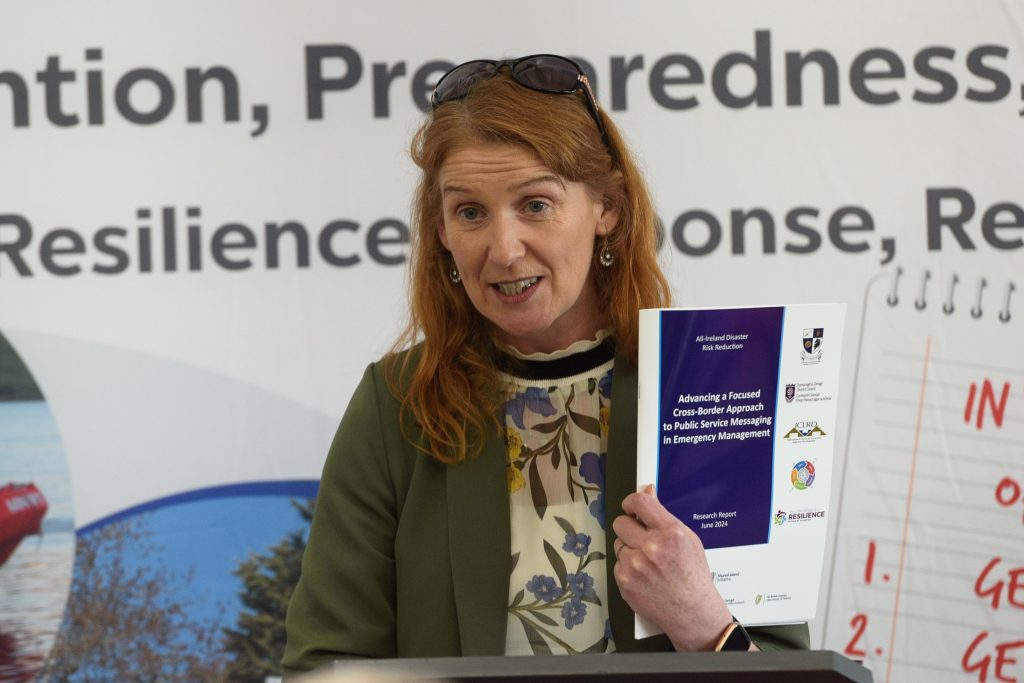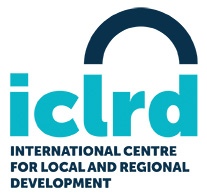A major new research report on public safety messaging on the island of Ireland by the International Centre for Local and Regional Development (ICLRD) at Maynooth University was launched today, 19th June, by Minister for Housing and Local Government, Darragh O’ Brien, in Clones Fire Station, Co. Monaghan.
The report, Advancing a Focused Cross-Border Approach to Public Service Messaging in Emergency Management, draws on case studies in counties Monaghan and Fermanagh, and highlights the importance of proactive cross-border coordination among public authorities at strategic and operational levels in emergency management.

The research team was led by Dr Cormac Walsh, a senior research associate with the ICLRD and included ICLRD Director Caroline Creamer of Maynooth University (MU) Social Sciences Institute (MUSSI) and Innovation Value Institute (IVI), Dr Tadhg MacIntyre of the Department of Psychology, Dr Brendan Keegan of MU’s School of Business and Dr Adrienne McCann, formerly of MU.

The study was a partnership between ICLRD and Monaghan County Council, a member of the Cross Border Emergency Management Group (CBEMG), and involved close collaboration with colleagues in Northern Ireland, including Fermanagh and Omagh District Council. The research, which draws from two cases studies in the towns of Clones, Co Monaghan and Lisnaskea, Co Fermanagh, found that public safety messaging is not only about providing information to the public. “It is fundamentally about community engagement and providing effective empathic leadership in times of crisis,” the report says.
Speaking on the publication of this timely report, Dr. Cormac Walsh said “Building on ICLRD’s core strengths, we worked closely with Monaghan County Council and the Cross Border Emergency Management Group to deliver research of relevance to practitioners in emergency management in the border region. The report highlights and critically examines the relationship between public safety messaging and community engagement, and makes concrete recommendations for progressing emergency communications on a shared island basis”.
The report recommends that public safety messaging be universal, incorporating both analogue and digital means, and reach all sections of society, including the elderly, people with disabilities and people for whom English is not their first language.

According to Caroline Creamer, MU-based Director of the ICLRD: “Cross-border regions face specific challenges in emergency management – from legislative and policy differences, infrastructural deficits, poor mobile phone coverage, and an over-reliance on commercial social media platforms to disseminate messaging to all sections of society.”
“While one would expect that the task of communicating key messages or warnings to the public in cases of emergency would have become easier with more advanced communication technologies, this has not been the case. Rather, public safety messaging must compete for attention in an increasingly crowded media landscape. Clear, timely and effective communication is essential to emergency management and disaster risk reduction – whether at the scale of a national emergency or a localised incident.”
The report says that international experience indicates that location-based SMS at a local level can complement a national cell broadcast system, while a dedicated telephone line should be established to provide local and regionally specific information on current incidents and risks in accessible language.
It also noted that effective emergency management communication is dependent on the ability of citizens to reliably contact the emergency services by telephone from their home or place of work. It said public investment is required to improve mobile phone network coverage in the cross-border region.
It recommends that local authorities should consider producing a joint preparedness brochure or booklet with key contact information for emergency response agencies, for distribution to community organisations. “The booklet should provide information on potential risks in the cross-border region, where relevant, referencing past events (e.g., flooding, wildfires).”
The report also suggests that multi-organisational demonstration and contingency scenario exercises, organised on a cross-border basis, can be an effective means of preparing for potential cross-border incidents and demonstrating to the public that the capacity for an effective cross-border response exists and can be called upon.
“Monaghan County Council, as a member of the CBEMG, welcomed the opportunity to lead this research study and collaborate directly with our colleagues in Northern Ireland. The study afforded an opportunity to engage directly with statutory agencies and community groups on both sides of the border via focus group sessions to obtain a qualitative overview of current practice,” MCC Chief Fire Officer Dermot Brannigan said.
“A CBEMG workshop reinforced the commitment to securing a universal public safety messaging approach and highlighted the immediate benefits of the local community as the medium to communicate. We are also acutely aware of the importance of public safety messaging in securing a sustainable climate.”
Robert Burns, Monaghan County Council Chief Executive, welcomed the report: “A whole of society approach to communication is a critical task of responding agencies’ during emergency incidents, and more so now in an era of changing methods of communication. Embracing technological both change and progress, while also ensuring a trusted narrative, will form the basis of all our future plans”.
In acknowledging the support of the Department of An Taoiseach, the Department of Defence and the Office of Emergency Planning, and the Shared Island Initiative for providing the funding to enhance cross-border cooperation in emergency management and enabling a mutual understanding, Dr. Cormac Walsh said, “We look forward to building on this work in a second phase of funding, which will focus on building back better following extreme events”.
A copy of the report can be found here.

